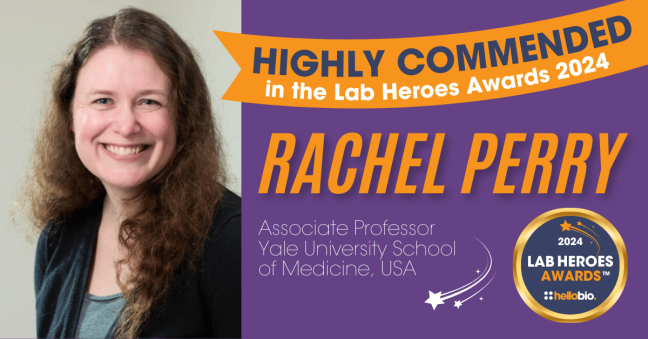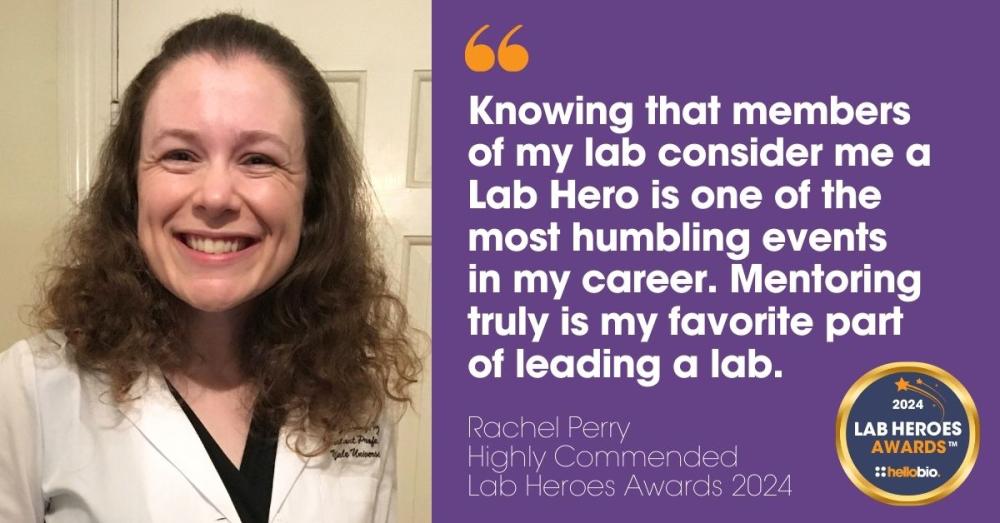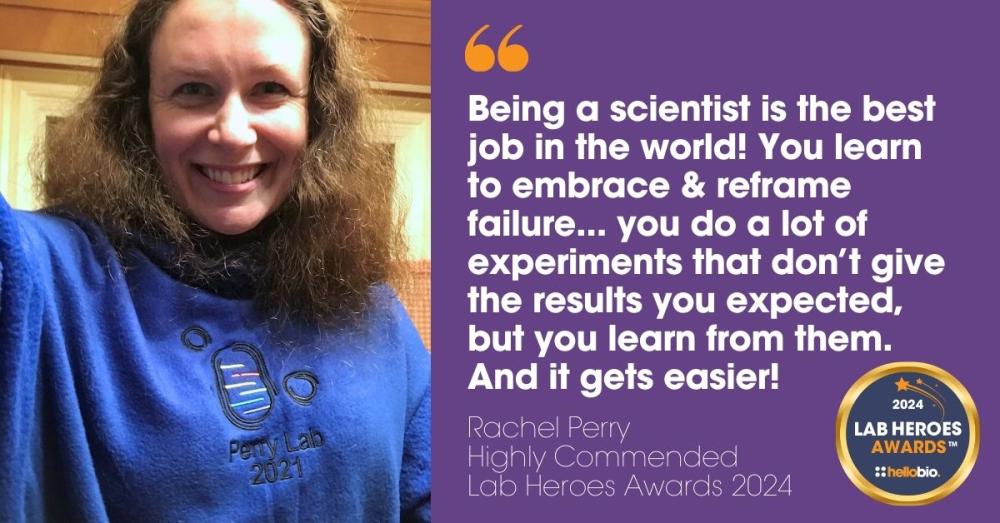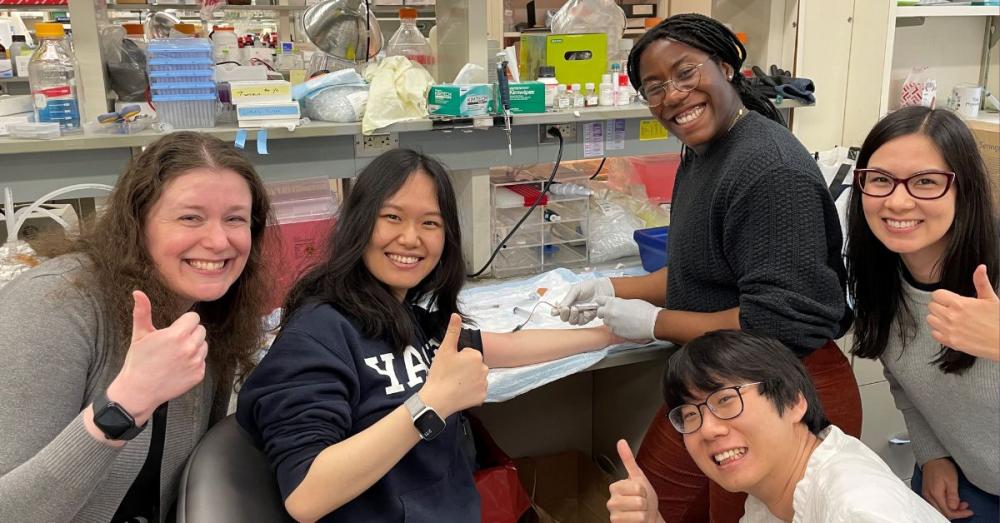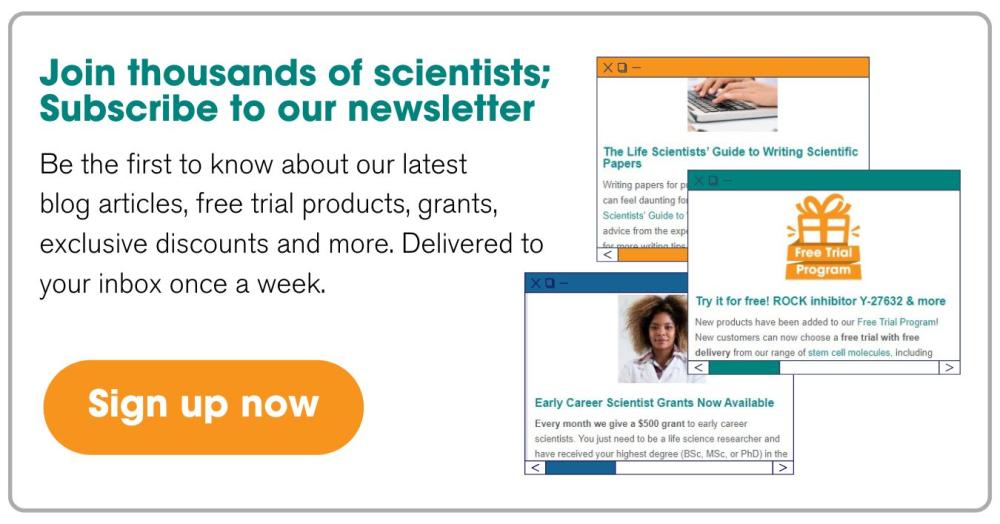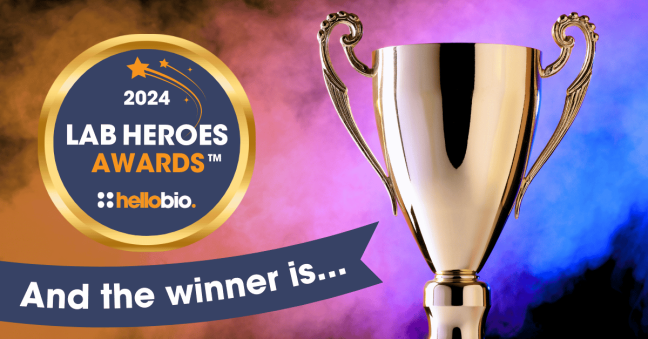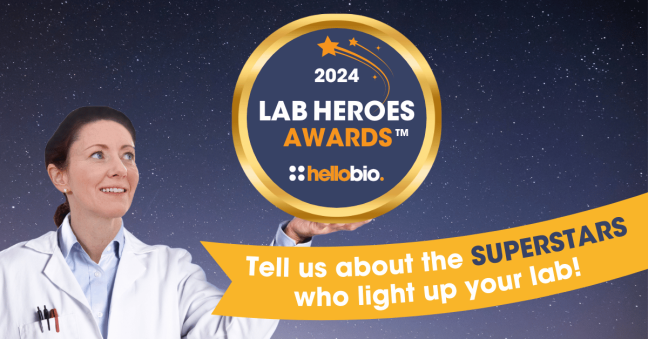Meet Our Lab Heroes Awards™ 2024 Highly Commended Nominees: Rachel Perry
Our annual Lab Heroes Awards™ competition is all wrapped up for another year and the standard as always was incredibly high! This year, in addition to choosing an overall winner, our judging panel also selected 10 highly commended ‘Lab Stars’ who they felt deserved special recognition! Over the coming weeks we’ll be publishing interviews with each of the runners-up to find out more about their research work, their thoughts on life science today, and the lab heroes who inspire them!
The first of our highly commended nominees is Rachel Perry, an Associate Professor of Cellular & Molecular Physiology, Internal Medicine (Endocrinology), and Comparative Medicine at Yale University. Rachel was nominated by colleagues Yanitza Rodriguez, Abigail Koomson and Ngozi Akingbesote who praised her for her impact on lab culture, promotion of diversity and inclusion, and for actively supporting students from underrepresented groups. Yanitza described her as ‘an extraordinary mentor and an unwavering pillar of support’ who has ‘positively influenced the lives of so many in the lab’.
Rachel admits that her career path has been unusual in that all of her training since her undergraduate days has been at the same institution, and she even stayed to open her own lab in 2018! Her first scientific love is metabolism, which was the topic of her training. When opening her lab, Rachel has shifted to studying systemic physiology and pathophysiology that is affected by shifts in systemic metabolism, including cancer, infection, reproductive dysfunction, and recovery from injury. Rachel has been fortunate to be the recipient of several awards, including her selection as a Blavatnik Regional Finalist, receipt of K99/R00 and R37 awards from the NIH, and the American Physiological Society’s New Investigator Award in Endocrinology & Metabolism.
We had a great conversation with Rachel about her current research work, the importance of celebrating life science researchers, and her passion for promoting diversity and inclusion in STEM.
Congratulations, Rachel! How did it feel to find out that three of your colleagues had nominated you as their Lab Hero?
I’ve been fortunate at many different points in my career, but knowing that members of my lab consider me a Lab Hero is one of the most humbling events in my career. Mentoring truly is my favorite part of leading a lab, so knowing that I have been effective at least in some ways is really rewarding for me.
How did it feel to learn you had been chosen as a 'Highly Commended' nominee?
I was surprised in the best way to learn I’d been named a “highly commended” nominee! Reading through other nominations made clear the incredibly high caliber of those who were nominated (I loved reading the nominations and learning from them, too!) and it was incredibly rewarding to know that I’d been recognized.
Why do you think it’s so important to celebrate life science researchers, and what more could be done to show recognition in life science?
I think there are two answers to this question – why it’s important to celebrate life science researchers and why it’s important to celebrate mentors, so like most long-winded scientists, I’m going to answer both! Unfortunately, we live in a world where we as scientists often have to justify the importance of what we are doing, especially because many experiments don’t produce the expected results. And that’s appropriate: creating new knowledge usually means two steps forward, one step back! But for lay folks, this can erode confidence in the scientific process, or even in the motivations of scientists. We need life science research to create discovery, and I think it’s crucial to show that we scientists are people who are doing our best. Sometimes we get it wrong, but we need to keep doing what we’re doing!
And that leads into the second part of my answer: I firmly believe that a critical part of being the human sort of scientist is nurturing the other humans around us (i.e. our mentees). It is so important to celebrate good mentorship. I’d never portray myself as an expert in this area, but I do try, and I know so many other scientists who try just as hard. While this isn’t celebrated like papers or grants, we need a focus on mentorship to keep the gears of science turning. That’s what this award does, it recognizes mentorship and effort in optimizing lab culture, and I’m grateful to Hello Bio for putting in that effort.
Pictured: Rachel Perry with members of the Perry Lab in their lab PJs!
Did you always want to be a scientist when you were younger, and if so, why?
I was one of those kids who loved every subject in school. There were periods when I wanted to be a librarian, a teacher, a doctor, and various other careers. But once I joined a lab in college, I was hooked – and I stayed in that lab for the next 12 years as an undergrad, PhD student, and postdoc!
What do you enjoy most about working in STEM?
I get to go to work every day (or, let’s be real, sit at my dining room table-slash-home office working into the evening) and have the privilege to explore whatever my lab members and I are interested in. How cool is that: we can literally explore any question that we find important, and there is SO MUCH to study in STEM. There are few jobs where you have this creative freedom, and it’s what’s going to keep me in this line of work forever.
Can you tell us a bit more about what you're working on in the lab at the moment?
Our lab is interested in anything and everything related to metabolism! I strongly believe that science works best when trainees pursue projects that are most exciting to them, as long as we have the resources and expertise to pursue them (or to find collaborators to help). So, members of my lab are pursuing several aspects of cancer metabolism, including examining both the systemic metabolic and neuro-metabolic underpinnings of cancer-related fatigue, the impact of systemic metabolic alterations and metabolism-targeting medications on the response to immunotherapy, and the role of local glucose production on tumor progression – the potential for lifestyle changes, including diet and exercise, to affect outcomes in acute sepsis and in sepsis survivors; the molecular mechanisms by which obesity promotes reproductive dysfunction; and the immunometabolic mechanisms by which a certain form of strength training improves recovery from orthopedic surgery. This may change in a few years, though: with new lab members come new ideas and new directions!
What does a typical day in the lab look like for you?
This is one of the things I love about leading a lab: every day is different! But there are patterns. Most of my work days are spent in meetings, including thesis committees, various organizing committees, and others including my favorites: weekly meetings individually with each member of my lab; teaching (each spring, I teach a survey course in metabolism with a longtime colleague); writing letters of recommendation; and handling the logistical issues that come with running a lab (I receive around 300 emails a day, and most need responses!). Then much of the “meat” of my job (that is, grant writing and editing students’ writing) happens in the evening, when I can work more continuously. I wouldn’t necessarily advocate this work/life balance, but it works for me!
What do you think are the biggest challenges facing life scientists at the moment?
That’s a big question! It’s maybe a mundane answer, but I think the biggest challenge is funding (I know this is a universal problem, and in the US we have a lot of advantages in that area, but even so only around 10 percent of NIH grants are funded, meaning a lot of good science never is completed). Additionally, most funding mechanisms require what I call “fireworks science”: it needs to be flashy and have transformational potential to have a shot at being funded. Of course this science is critically important, but so is less “shiny” science: repeating work in another lab to ensure that the conclusions are correct, replicating a study in another sex or age, and so on. This type of study is extraordinarily hard to get funded, but not doing these experiments limits our ability to safely translate flashy discoveries to treatments.
Your colleague praised you for your commitment to promoting diversity and inclusion in STEM. Why is this so important to you, and what more do you think should be done to support scientists from underrepresented groups?
Yes, it’s very important to me to help extend the ladder for those who come next, particularly folks from historically marginalized groups. As a privileged white woman, I have had so many advantages that have made it much easier for me to land where I am, and I really want to do my part to help level the playing field. (That’s aspirational of course, but clearly we can do better.) I think the first step is to listen and to (literally) put our money where our mouth is. We don’t need more committees (which are always largely made up of trainees and faculty from marginalized backgrounds who already have plenty on their plates), we need support (financial, not just tweets) for initiatives that they are already leading and believe will be worthwhile. We overrepresented people shouldn’t be pretending we can determine what is worthwhile for others.
What key piece of advice would you give to a younger scientist just starting out in their career?
Being a scientist is the best job in the world! And also, you’ll learn to embrace and reframe “failure.” I often say to my lab members: if we knew the results of an experiment beforehand, we wouldn’t be doing the experiment, so you’ll do a lot of experiments that don’t give you the results you expected, but you’ll learn from them. It gets easier!
How do you see your career developing in the future/where do you see yourself in 10 years?
I can’t answer that question too specifically, because it is really important to me to let the directions of the lab be led by the lab members (with my guidance of course). Depending on who joins us next, we could be anywhere in the body that is related to metabolism (which, in my view, is anywhere in the body: metabolism is critical everywhere!).
Who is YOUR lab hero? Which scientist or mentor has inspired you the most in your career so far?
If I may, I’d like to name two. My first lab mentor was Dr. David Van Wagoner at the Cleveland Clinic, who generously took me into his lab for a summer while I was a high school student. I now understand that it was a lot of work for him with relatively little benefit, but this experience truly got me started on my scientific career. It was so exciting to come full circle and return to Cleveland at David’s invitation to give a talk at the Cleveland Clinic. He’s one of my lab heroes because of his willingness to take a chance on totally unproven high school students – this can make a life-changing difference, and I try to pay that forward.
My second – but certainly not lesser – lab hero is Dr. Valentina Greco at Yale. Through a longtime collaboration which has just been published online, I have had the chance to work closely with Valentina and see the steady, graceful leadership that she uses in running her lab. I have also seen the tremendous work she does for equity and inclusion of both women and colleagues from historically marginalized backgrounds in science, and I admire it tremendously – as well as her cutting-edge science, of course!!
What’s your favourite science quote?
“Nothing in life is to be feared, it is only to be understood. Now is the time to understand more, so that we may fear less.” – Marie Curie. That’s certainly our goal in the Perry lab – and really in all labs, I think!
Is there anything else you would like to tell us, eg. specific issues or initiatives in science that you are involved with or are passionate about?
Thanks for asking! I would love to tell you more about the Yale VIBES (Virtual Internships in Biomedical Education in Science) program. This program was created a little over a year ago by Ngozi Akingbesote, a grad student in my lab and one of my nominators and myself, and now is co-led by Yanitza Rodríguez, another grad student in my lab and another of my wonderful nominators. VIBES is a paid, two-semester virtual internship (approx. 5 hours weekly) for undergraduate students from historically marginalized backgrounds. The program offers students the opportunity to partner with faculty at Yale to perform data analysis, figure construction, and/or writing projects, and of equal importance, to gain mentorship, form connections, and be able to see themselves at Yale. We created this program as an opportunity for a science-based side job; there are many summer programs, but fewer for paid science work during the school year. We hope that VIBES will do a tiny bit to fill that gap. If any undergrad students reading this are interested, you can find more information at Yale VIBES Program – Perry Lab!
Pictured: Rachel Perry (left) and members of her team carry out a blood draw at the Perry Lab
________________________________
Thank you so much for speaking to us Rachel! And congratulations once again on being highly commended!
Connect with Rachel and her team at the Perry Lab:
-
X (Twitter): @rachelperrylab1
-
Lab website: https://rachelperrylab.com/
Find out more about our Lab Heroes Awards™ 2024 winner and highly commended nominees here: https://hellobio.com/blog/meet-the-lab-heroes-awards-2024-winner.html
________________________________
If you enjoyed this article, why not check out the other resources available on our blog. We are passionate about supporting life scientists including early career life scientists and PhD students - with really low-priced reagents, antibodies and biochemicals, early career scientist grants, and resources to help with both personal and professional development. We know how tough it is - so we hope you find these helpful!
More General Support for Life Scientists
For advice on wellbeing, dissertations, presenting at conferences, wellbeing, PhD support, networking and lots more, we have a huge range of articles to help - just click below:
Save up to 50% on our high purity reagents...
When you get to the stage of planning your experiments, don't forget that we offer a range of low-cost, high-purity agonists, antagonists, inhibitors, activators, antibodies and fluorescent tools (yes - they really are around half the price of other suppliers!) You can use our Quick Multi-Search Tool to search for lots of products in one go, and the range includes:
- Enzyme inhibitors and activators
- Chemogenetic ligands
- Ion channel modulators
- GPCR & ionotropic receptor ligands
- Cell biology reagents & biochemicals
Technical resources
Try our Molarity Calculator: a quick and easy way to calculate the mass, volume or concentration required for making a solution.
Try our Dilution Calculator: an easy way to work out how to dilute stock solutions of known concentrations
We also offer a comprehensive range of technical resources including antibody protocols and methods, product guides and mini-reviews:
And finally, don't forget to check back in with our blog regularly for our latest articles. If there’s something you’d love to contribute to the community, whether that’s an interview or article, drop us a line at hello@hellobio.com
---





